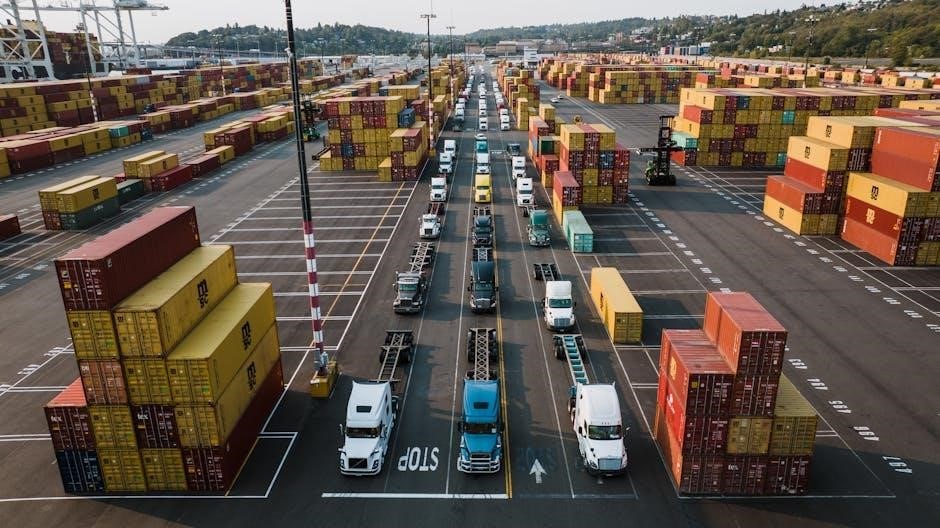Operations and Supply Chain Management (OSCM) is fundamental in managing operations across industries, ensuring efficient supply chain processes, and balancing cost-effectiveness with innovation in a global context.
1.1. Definition and Scope of OSCM
Operations and Supply Chain Management (OSCM) involves planning, sourcing, producing, delivering, and returning products and services. It integrates supply chain processes to create value, ensuring efficiency and effectiveness. OSCM spans manufacturing and service industries, focusing on capacity planning, inventory management, and logistics. Its scope extends to aligning business strategy with operational goals, leveraging technology to optimize workflows and enhance global competitiveness.
1.2. Importance of OSCM in Global Business
OSCM is vital for global business success, enabling firms to streamline operations, reduce costs, and enhance customer satisfaction. By optimizing supply chain processes, companies gain a competitive edge, improve efficiency, and adapt to market demands. Effective OSCM fosters collaboration, innovation, and sustainability, ensuring resilience in an ever-changing global economy while driving long-term growth and profitability.

Key Concepts and Tools in OSCM
Key concepts include capacity planning, inventory management, and flow optimization. Tools like ERP systems and analytics enhance decision-making, ensuring efficient operations and supply chain alignment.
2.1. Capacity Management and Planning
Capacity management involves aligning resources to meet demand efficiently. Key concepts include capacity planning, economies of scale, and flexibility. Effective planning ensures optimal resource utilization, minimizing waste and enhancing productivity. Jacobs emphasizes the importance of capacity decisions in supply chain strategy, balancing long-term investments with fluctuating demand to maintain a competitive edge in global markets.
2.2. Inventory Management and Flow
Effective inventory management ensures the right stock levels to meet demand without excess. Jacobs highlights techniques like just-in-time systems and demand forecasting to optimize inventory flow. Proper management reduces carrying costs, minimizes stockouts, and enhances supply chain efficiency, ensuring smooth material and product flow across the entire supply chain network.

Supply Chain Strategy and Design
Aligning supply chain strategies with business objectives ensures efficiency and innovation. Jacobs emphasizes integrated design, fostering collaboration and optimizing processes to meet global market demands effectively.
3.1. Supply Chain Integration and Collaboration
Effective supply chain integration and collaboration streamline processes, enhance visibility, and foster trust among partners. Jacobs highlights the importance of aligning objectives and leveraging technology to ensure seamless coordination across the supply chain network, driving efficiency and competitive advantage in global markets through improved communication and shared goals.
3.2. Reducing Costs in Supply Chain Processes
Reducing costs in supply chain processes involves optimizing resource allocation, minimizing waste, and improving operational efficiency. Jacobs emphasizes strategies like lean manufacturing, inventory control, and supplier collaboration to lower expenses while maintaining quality, ensuring sustainable cost reduction without compromising service levels or product integrity in competitive markets.
Global Operations and Supply Chain Management
Global operations and supply chain management involves coordinating processes across borders, addressing cultural, logistical, and regulatory challenges to ensure efficient and competitive business operations worldwide.
4.1. Globalization and Its Impact on OSCM
Globalization has significantly influenced OSCM by expanding market reach and intensifying competition. Companies must adapt to diverse regulatory environments, cultural differences, and varying consumer demands. This necessitates advanced supply chain strategies to manage global sourcing, logistics, and distribution effectively. Jacobs emphasizes the importance of integrating technology and fostering collaboration to maintain operational efficiency in a globalized economy.
4.2. Cross-Border Supply Chain Challenges
Cross-border supply chains face challenges such as complex customs regulations, varying trade policies, and logistical complexities. Jacobs highlights issues like tariff uncertainties, language barriers, and differing documentation requirements. Additionally, geopolitical tensions and infrastructure disparities can disrupt supply chain flow, necessitating robust risk management strategies to ensure smooth operations and maintain cost efficiency in global markets.

Service Operations and supply chain Management

Service Operations and Supply Chain Management
Service operations management focuses on delivering intangible goods, requiring unique strategies to ensure quality, customer satisfaction, and efficient supply chain integration in dynamic business environments.
5.1. Managing Service Operations Effectively
Managing service operations effectively involves implementing strategies to enhance customer satisfaction, streamline processes, and improve resource allocation. By leveraging technology and data analytics, organizations can optimize service delivery, ensure consistency, and adapt to changing demands. Effective communication and collaboration among teams are critical to maintaining high service standards and achieving operational excellence in dynamic environments.
5.2. Role of Technology in Service Supply Chains
Technology plays a pivotal role in enhancing service supply chains by improving efficiency, transparency, and customer satisfaction. Tools like ERP systems and e-business solutions enable real-time data sharing, streamline operations, and optimize resource allocation. Automation and analytics further support decision-making, ensuring seamless service delivery and adaptability to market changes, thereby driving competitive advantage and operational excellence in service-oriented industries.

Sustainability in Operations and Supply Chain Management
Sustainability in OSCM focuses on reducing environmental impact through eco-friendly practices, ethical sourcing, and waste reduction, ensuring long-term viability while aligning with global standards and social responsibility.
6.1. Sustainable Practices in Supply Chain Processes
Sustainable practices in supply chain processes involve implementing eco-friendly sourcing, reducing waste, and optimizing energy use to minimize environmental impact. These practices align with global standards, ensuring ethical production and distribution while fostering long-term viability and social responsibility.
6.2. Ethical Considerations in OSCM
Ethical considerations in OSCM emphasize fair labor practices, transparency, and compliance with global standards. Ensuring ethical sourcing, reducing exploitation, and promoting sustainable practices are critical. Organizations must align their supply chain activities with moral principles to build trust with stakeholders and maintain a positive brand reputation in an increasingly accountable business environment.

Advanced Topics in OSCM
Advanced OSCM explores e-business, ERP systems, and modern trends in supply chain strategy, emphasizing technology integration and data-driven decision-making to enhance efficiency and innovation.
7.1. E-Business and ERP Systems in OSCM
E-business and ERP systems revolutionize OSCM by integrating processes, enhancing transparency, and enabling real-time data access. These tools streamline operations, improve decision-making, and foster collaboration across global supply chains, ensuring alignment with modern trends like digital transformation and sustainable practices.
7.2. Modern Trends in Supply Chain Strategy
Modern trends in supply chain strategy emphasize sustainability, ethical sourcing, and digital transformation. These approaches optimize performance, enhance transparency, and foster resilience. By aligning with global standards and leveraging advanced technologies, businesses can achieve competitive advantages while addressing evolving challenges in the dynamic global market.
The Role of Operations Management in Supply Chains
Operations management is crucial in coordinating resources and processes within supply chains. It ensures efficient capacity planning, inventory flow, and production scheduling, aligning with strategic business goals.
8.1. Resource Management in Operations
Resource management in operations involves optimizing the allocation of labor, materials, and technology to achieve business objectives. Effective resource management ensures productivity and cost-efficiency.
Tools like ERP systems and data analytics support decision-making, aligning resources with strategic goals. Proper resource management enhances operational efficiency, reduces waste, and improves supply chain responsiveness.
8.2. Flow of Information in Supply Chains
The flow of information in supply chains ensures seamless coordination between suppliers, manufacturers, and customers. Advanced tools like ERP systems enable real-time data sharing, improving decision-making. Effective information flow reduces costs, enhances transparency, and fosters collaboration across the supply chain. Jacobs emphasizes the importance of integrated information systems in achieving operational efficiency and competitive advantage in global markets.

Future Trends in Operations and Supply Chain Management
Future trends in OSCM include digital transformation, AI integration, and sustainable practices. These innovations enhance efficiency, reduce costs, and align with global demands for ethical and environmentally conscious operations.
9.1. Impact of Digital Transformation on OSCM
Digital transformation revolutionizes OSCM by integrating advanced technologies like AI, IoT, and blockchain. These tools optimize supply chain visibility, enhance decision-making, and improve operational efficiency. Companies adopting these innovations gain a competitive edge through real-time data analytics and automation, enabling faster responses to market changes and customer demands while reducing operational costs and minimizing risks.
9.2. Evolving Challenges in Global Supply Chains
Global supply chains face increasing complexity due to trade dynamics, geopolitical tensions, and unpredictable demand. Companies must navigate risks like supplier insolvency, regulatory changes, and environmental concerns. Additionally, ethical considerations and sustainability pressures are rising, requiring agile and resilient strategies to maintain operational excellence and long-term competitiveness in an ever-changing global landscape.
Contributions of F. Robert Jacobs to OSCM
F. Robert Jacobs is a renowned author and educator, contributing significantly to OSCM through textbooks like Operations and Supply Chain Management, shaping academic and industry practices globally.
10.1. Overview of Jacobs’ Work in OSCM
F. Robert Jacobs is a leading authority in Operations and Supply Chain Management, known for his textbooks that bridge theory and practice. His work emphasizes supply chain integration, capacity planning, and sustainable practices. As a professor at Indiana University, Jacobs has influenced both academia and industry, focusing on optimizing supply chain processes and fostering competitiveness in global markets through innovative strategies and tools.
10.2. Key Publications and Their Impact
F. Robert Jacobs is renowned for his influential textbooks, including Operations and Supply Chain Management and Manufacturing Planning and Control for Supply Chain Management. These works provide comprehensive insights into OSCM, blending theory with practical applications. His publications are widely adopted in academia and industry, shaping understanding of supply chain strategies, capacity planning, and technological integration, thereby influencing both education and professional practice globally.

No Responses